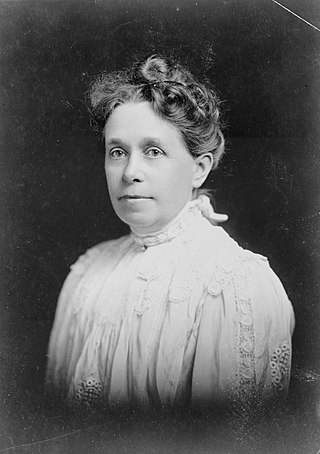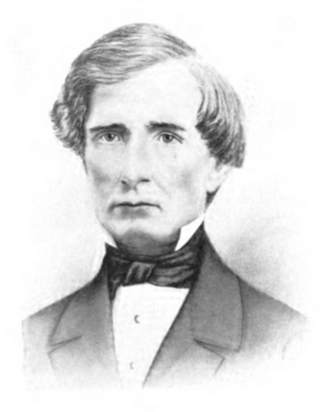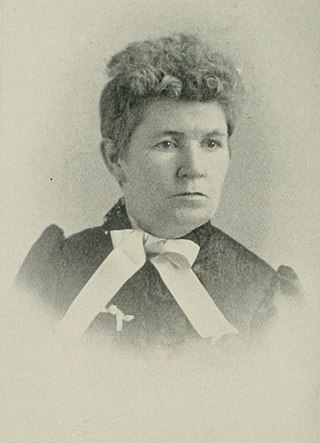The Woman's Christian Temperance Union (WCTU) is an international temperance organization. It was among the first organizations of women devoted to social reform with a program that "linked the religious and the secular through concerted and far-reaching reform strategies based on applied Christianity." It plays an influential role in the temperance movement. Originating among women in the United States Prohibition movement, the organization supported the 18th Amendment and was also influential in social reform issues that came to prominence in the progressive era.

Janesville is a city in and the county seat of Rock County, Wisconsin, United States. As of the 2020 census, the city had a population of 65,615, making it the tenth-most populous city in Wisconsin. It is a principal municipality of the Janesville–Beloit metropolitan statistical area, which consists of all of Rock County and is included in the greater Madison–Janesville–Beloit combined statistical area.

Frances Elizabeth Caroline Willard was an American educator, temperance reformer, and women's suffragist. Willard became the national president of Woman's Christian Temperance Union (WCTU) in 1879 and remained president until her death in 1898. Her influence continued in the next decades, as the Eighteenth and Nineteenth Amendments to the United States Constitution were adopted. Willard developed the slogan "Do Everything" for the WCTU and encouraged members to engage in a broad array of social reforms by lobbying, petitioning, preaching, publishing, and education.

Lillian M. N. Stevens (1843–1914) was an American temperance worker and social reformer, born at Dover, Maine. She helped launch the Maine chapter of the Woman's Christian Temperance Union (W.C.T.U.), served as its president, and was elected president of the National W.C.T.U. after the death of Frances Willard. Stevens also served as Editor-in-chief of the W.C.T.U.'s organ, The Union Signal.

The Frances Willard House is a historic house museum owned by the National WCTU and is a National Historic Landmark at 1730 Chicago Avenue in Evanston, Illinois. Built in 1865, it was the home of Frances Willard (1839-1898) and her family, and was the longtime headquarters of the Woman's Christian Temperance Union (WCTU). Willard called the house Rest Cottage because it became a place for her to rest in between her tours and WCTU activities.

Anna Adams Gordon (1853–1931) was an American social reformer, songwriter, and, as national president of the Woman's Christian Temperance Union when the Eighteenth Amendment was adopted, a major figure in the Temperance movement.

Mary Greenleaf Leavitt was an educator and successful orator who became the first round-the-world missionary for the Woman's Christian Temperance Union (WCTU). Setting out on virtually non-stop worldwide tours over a decade, she "went to all continents save Antarctica," where she crusaded against alcohol and its evils including domestic violence; and advocated for women's suffrage and other equal rights such as higher education for women. In 1891 she became the honorary life president of the World's WCTU.

Josiah Flint Willard was an American dairy farmer, naturalist and businessman living in Janesville, Wisconsin, who served one term as a Free Soiler member of the Wisconsin State Assembly. He was the father of suffragist Frances E. Willard.

The Woman's Christian Temperance Union Administration Building is a historic building in Evanston, Illinois, United States. It has served as the publishing house and national headquarters of the Woman's Christian Temperance Union since its construction in 1910. The organization had an important role in the national discussion on prohibition and women's suffrage.

Sarah F. Cowles Little was an American educator from the U.S. state of Ohio. She served as Superintendent of the Wisconsin School for the Blind and Visually Impaired in Janesville, Wisconsin.

Delia Krum Collins was an educator, philanthropist and reformer.

Caroline Brown Buell was an American activist who lectured and wrote on behalf of temperance and suffrage. She served as the assistant recording secretary (1878–80), corresponding secretary (1880–93), and a member of the Our Union publication committee (1876–83) of the National Woman's Christian Temperance Union (WCTU); as well as the president (1904) and corresponding secretary (1875–86) of the Connecticut WCTU. She also originated the plan of the Loyal Temperance Legion, the children's society of the WCTU. Buell wrote extensively for temperance publications, and other papers and magazines. She made her home in East Hampton, Connecticut.

Clara Cleghorn Hoffman was an American educator and temperance reformer. She became identified with the white-ribbon movement in Kansas City, Missouri, giving up her position as principal of a school to enter the work of the Woman's Christian Temperance Union (WCTU). She served as President of the Missouri WCTU for 25 years. Within the National WCTU, she lectured across the U.S, was chosen Assistant Recording Secretary, and Recording Secretary, succeeding Lillian M. N. Stevens.

Lillian Hollister was an American temperance and church worker. Hollister served as Supreme Commander of the Ladies of the Maccabees.

Julia Colman was an American temperance educator, activist, editor and writer of the long nineteenth century. She served as superintendent of literature in the Woman's Christian Temperance Union (WCTU).

Minerva Brace Norton was an American educator and writer. She was from her early youth until her last days a constant contributor to periodical literature. For most of her life, she also filled the role of a pastor's wife.

Mary Thompson Hill Willard was an American teacher and social reformer. Her daughter, Frances Willard, was the founder and president of the World's Woman's Christian Temperance Union (W.C.T.U.) as well as president of the National W.C.T.U.

Lucy Switzer was an American temperance and suffrage activist. She wrote many articles for Pacific Christian Advocate and the Christian Herald, and was a columnist in Cheney, Spokane County, Washington. She established the women's suffrage movement in eastern Washington Territory.

The Union Signal is a defunct American newspaper. It was the organ of the National Woman's Christian Temperance Union, at one time, the largest women's organization in the United States.

Amy Kellogg Morse was an American teacher, abolitionist, and temperance lecturer. She served as President of the Wisconsin State Woman's Christian Temperance Union (WCTU).



















